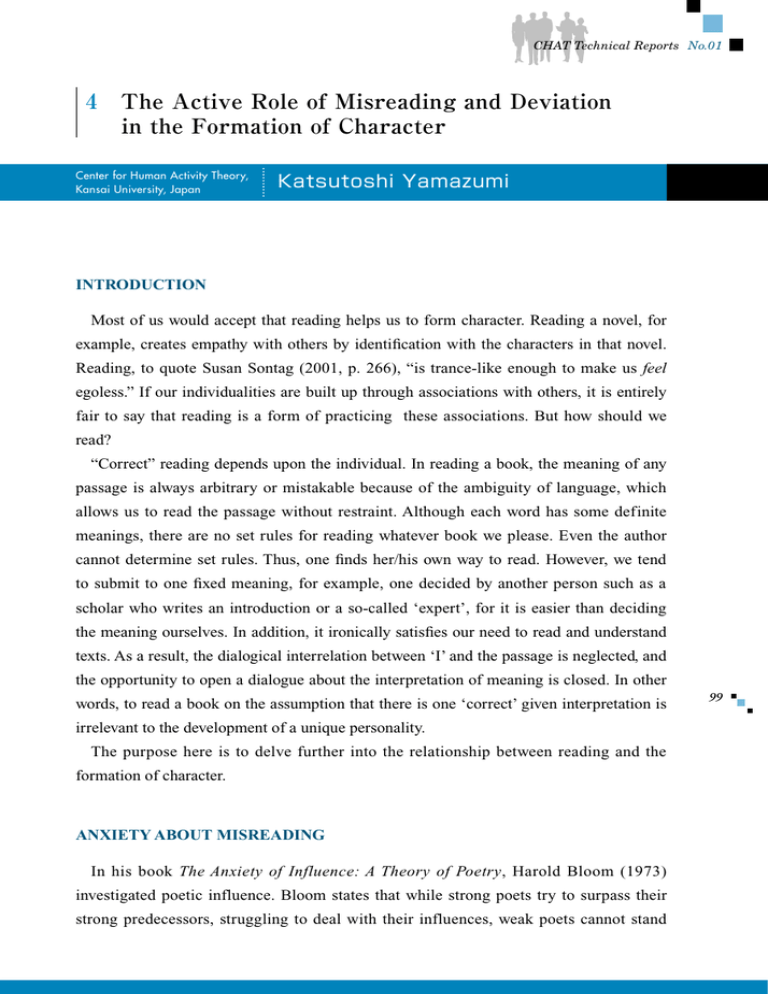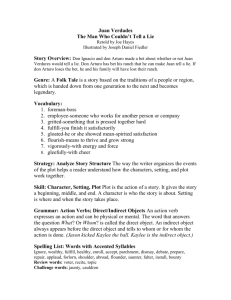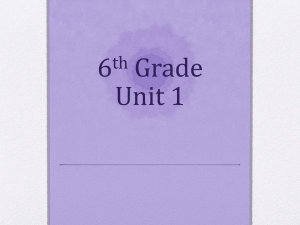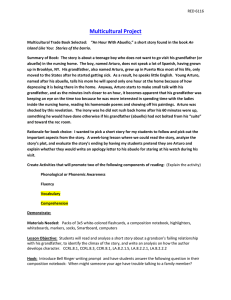4 The Active Role of Misreading and Deviation in the Formation of
advertisement

CHAT Technical Reports No.01 4 The Active Role of Misreading and Deviation in the Formation of Character Center for Human Activity Theory, Kansai University, Japan Katsutoshi Yamazumi INTRODUCTION Most of us would accept that reading helps us to form character. Reading a novel, for example, creates empathy with others by identification with the characters in that novel. Reading, to quote Susan Sontag (2001, p. 266), “is trance-like enough to make us feel egoless.” If our individualities are built up through associations with others, it is entirely fair to say that reading is a form of practicing these associations. But how should we read? “Correct” reading depends upon the individual. In reading a book, the meaning of any passage is always arbitrary or mistakable because of the ambiguity of language, which allows us to read the passage without restraint. Although each word has some definite meanings, there are no set rules for reading whatever book we please. Even the author cannot determine set rules. Thus, one finds her/his own way to read. However, we tend to submit to one fixed meaning, for example, one decided by another person such as a scholar who writes an introduction or a so-called ‘expert’, for it is easier than deciding the meaning ourselves. In addition, it ironically satisfies our need to read and understand texts. As a result, the dialogical interrelation between ‘I’ and the passage is neglected, and the opportunity to open a dialogue about the interpretation of meaning is closed. In other words, to read a book on the assumption that there is one ‘correct’ given interpretation is irrelevant to the development of a unique personality. The purpose here is to delve further into the relationship between reading and the formation of character. ANXIETY ABOUT MISREADING In his book The Anxiety of Influence: A Theory of Poetry, Harold Bloom (1973) investigated poetic influence. Bloom states that while strong poets try to surpass their strong predecessors, struggling to deal with their influences, weak poets cannot stand 99 4 The Active Role of Misreading and Deviation in the Formation of Character Katsutoshi Yamazumi their feelings of anxiety about being influenced and are consequently trapped by or bound to the influence of these strong predecessors. Strong poets venture to misread the poetry of those strong precursors in order to create original poetry. Poetic Influence, when it involves two strong, authentic poets, always proceeds by a misreading of the prior poet, an act of creative correction that is actually and necessarily a misinterpretation. The history of fruitful poetic influence, which is to say the main tradition of Western poetry since the Renaissance, is a history of anxiety and self-saving caricature, of distortion, of perverse, wilful revisionism without which modern poetry as such could not exist. (Bloom, 1973, p.30. Italics original) Bloom (1973, p.14) calls such misreading “clinamen”, which is derived from Lucretius and means “a ‘swerve’ of atoms so as to make change possible in the universe.” There is a suggestion here that a misreading does not end in failure but rather becomes an opportunity for creation. Bloom (1973, p.43) says that “perhaps there are only more or less creative or interesting mis-readings, for is not every reading necessarily a clinamen?” Although poetic influence has no connection with the main subject, the same may be said of an act of reading, even if we are not (strong) poets. On one hand, the reader obediently internalises the world of a book that she/he reads, but on the other, the same 100 reader often deviates from the so-called “correct” interpretation as she/he pleases, which then externalizes the interaction between the reader and the text. Worrying about misreading, the reader is voluntarily influenced by the preceding interpretation as a means of understanding the text. In such a case, the reader is like a weak poet who cannot build her/his own style. If the reader does not rely upon others’ judgments of a book, how does she/he read it? And how does this kind of reading promote her/his development? CHAT Technical Reports No.01 AN EXAMPLE OF THE READER INDULGING HIMSELF/HERSELF IN READING The Road to Los Angeles (Fante, 2002), written by the Italian-American novelist John Fante, provides us with a pertinent example of the act of misreading a text. First, it may be useful to look carefully into the novel’s plot. It depicts the process of how the protagonist makes a firm decision to become a writer. The protagonist is an eighteen-year old ItalianAmerican boy, Arturo Bandini, who, after his father’s death, supports his mother and younger sister by working at a canning plant at the Los Angeles Harbor with immigrants from Southeast and East Asia. While resigning himself to a life of hard work and small reward, he aims to become a writer. He, as a bookish boy, had read a lot of difficult philosophy books written by Nietzsche, Spengler, Kant, Schopenhauer, and so on. Although he is conscious of misunderstanding them, he loves such lofty books, probably because they release him from the stern realities of life. He views his surroundings, which he feels are populated with uncultured people, with loathing. Arturo’s half-baked knowledge, gained from books, encourages his negative attitude toward the world. Whenever someone says something that displeases Arturo, he insults them with swearwords. When, for example, his uncle Frank, who finds Arturo a job and supports his family, criticizes Arturo for indulging himself in reading, Arturo talks back to Frank, saying, 101 “Books!” I said. “And what do you know about books! You! An ignoramus, a Boobus Americanus, a donkey, a clod-hopping poltroon with no more sense than a polecat.” (Fante, 2002, p. 39) Richard Collins (2000, p. 109) judges Arturo to be a “master of the lyric insult, the poetic slander, the creative racial slur, the name-calling epithet, and the periodic imprecation.” On the other hand, Arturo loves himself as if he were a great person. It seems that he tries to ennoble his character by looking down on and making blistering remarks about other people. This shows his character has been strongly influenced by 4 The Active Role of Misreading and Deviation in the Formation of Character Katsutoshi Yamazumi the above-mentioned German philosophers. He does not care about influence like the poets Harold Bloom refers to. Most influential of all is Friedrich Nietzsche’s Thus Spoke Zarathustra. The idea of superman in Zarathustra keeps reminding Arturo not to be weak, but to be strong. He says, It is better to be strong than to be weak, for to be weak is to lack strength. Be strong, my brother, for I say unless ye be strong the forces of evil shall get ye. All strength is a form of power. All lack of strength is a form of evil. All evil is a form of weakness. Be strong, lest ye be weak… Oh Zarathustra, endow thy men with plenty of strength! (Fante, 2002, pp. 29-30) The following passage from Thus Spoke Zarathustra indicates why Arturo uses swearwords. “There is much filth in the world…. There is wisdom in the fact that much in the world smells ill: disgust itself creates wings and water-divining powers!” (Nietzsche, 2003, p. 222). That is, Arturo throws smut at the world in order to get such power. It seems that Arturo regards ‘the strong’ as being people who have the physical force to defeat ‘evil.’ Jean F. Béranger (1999, p. 79) points out that “Arturo gets only half the message” from Nietzsche by reducing the meaning of the strong to that of the brutal. What are the strong as being people to Nietzsche? According to a Nietzsche scholar, Maki Shimizu (2003, p. 89), the strong have the desire to live in spite of the fact that life 102 is filled with much pain and nonsense. “Life is hard to bear” (Nietzsche, 2003, p. 68). In other words, the strong have the power of resistance to the pessimistic views of the present. On the contrary, it is the weak that need protection, for example, by Christianity, which gives comfort against the pressure of such pessimistic views. In Nietzschean thought, the concept of strength which the strong have does not mean exerting physical force. We can say that Arturo misread this point. It may be that Arturo was under the direct influence of Nietzschean (Zarathustra) thought because of his Catholic background (his mother and sister are pious Catholics). After he recalls going to confession in the past, he tries to enact a confession of faith: CHAT Technical Reports No.01 Our Father who art in Heaven, hallowed be Thy name, Thy kingdom come… I didn’t believe that anymore. There wasn’t any such thing as heaven; there might be a hell, it seemed very possible, but there wasn’t any such thing as heaven. (Fante, 2002, p.109) Although Arturo’s devotion to Nietzsche can be explained by his faithlessness, this is irrelevant to the main subject. What is important is that for good or ill, reading Nietzsche brought a new phase in Arturo’s life. Failing in his confession to God and Nietzsche, Arturo finally begins to give high praise to himself. “Arturo, my man. My beloved Arturo. It seems you suffer so much, and so unjustly. But you are brave, Arturo. You remind me of a mighty warrior, with the scars of a million conquests. What courage is yours! What nobility! What beauty! Ah, Arturo, how beautiful you really are! I love you so, my Arturo, my great and mighty god. So weep now, Arturo.” (Fante, 2002, p. 110-111) In Thus Spoke Zarathustra, which is also a parody of the New Testament, Zarathustra preaches “Only dare to believe in yourselves – in yourselves and in your entrails! He who does not believe in himself always lies” (Nietzsche, 2003, p. 146), whereas Arturo applauds himself as if he followed Zarathustra’s words. In other words, Arturo reads Nietzsche, as he wants, deviating from the historical and social context of Nietzsche. From this viewpoint, one may say that Arturo misreads Nietzsche. However, I said that reading Nietzsche brought a new phase in Arturo’s life; taking this opportunity, Arturo begins to explain something real in the form of a novel. In the end, Arturo embarks on a trip by midnight train to Los Angeles with the aim of becoming a writer. It is, of course, not only Nietzsche that triggered Arturo’s impulse to be a writer. It relates to interactions not only with many books read by Arturo but also others including his family. However, considering its influence over Arturo, we can say that reading Nietzsche’s Thus Spoke Zarathustra creates his future in spite of his misreading. 103 4 The Active Role of Misreading and Deviation in the Formation of Character Katsutoshi Yamazumi IT IS HARD TO MISREAD As Susan Sontag (1983) points out, if works of art including literature “give rise not to conceptual knowledge (which is the distinctive feature of discursive or scientific knowledge – e.g., philosophy, sociology, psychology, history) but to something like an excitation, a phenomenon of commitment, judgment in a state of thralldom or captivation” (p. 142), one may say that Arturo read Thus Spoke Zarathustra not as philosophy but as literature, for it captivated him. While Sontag (1983, p. 99) criticizes the philistinism of interpretation, which always pokes into the work of art one way or the other, the reason why the interpretation of art spreads is that “Interpretation makes art manageable, comfortable.” Such interpretation, to put it another way, becomes one answer that everybody holds in common, in which there is no dialogue between art and each audience. Thus, by managing to interpret literature, we fail to catch “something like an excitation.” What is “interpretation”? I use the word in the sense that there is no interaction between works of arts and audience but the intention of the “correct” answer to the works. Interpretation refuses to become dialogic and to engage in the misreading of a text; it also has the inclination to affix one meaning. However, especially in the case of literature, various meanings that result from the dialogical relationship between the work and audience mingle with each other. Moreover, dialogue, as M. M. Bakhtin (1981, p. 104 278) supposes, is inevitable in artistic prose. Accordingly, reading, to quote Sontag (2001, p. 266) again, “is trance-like enough to make us feel egoless,” which means that “I” as a reader do not decide on the “correct” interpretation but just devote “myself ” to the process of a dialogical relationship. In reading a book, we have to be in the process of a dialogue in order to catch “something like an excitation.” Such a reading frequently leads to misreading. However, in actual fact, misreading presumes that there is a “correct” reading that interpretation targets. One can say that a text is misread because the “correct” reading exists somewhere. In addition, we may say that there is no misreading without interpretation. It is hard to misread because we tend to seek out the “correct” reading, the answer. CHAT Technical Reports No.01 MINORITY AND MAJORITY On the difference between minorities and majorities, Gilles Deleuze (1995) states the following: The difference between minorities and majorities isn’t their size. A minority may be bigger than a majority. What defines the majority is a model you have to conform to: the average European adult male city-dweller, for example … A minority, on the other hand, has no model, it’s a becoming, a process. (Deleuze, 1995, p. 173) Although it seems that this extract has no connection with the main subject, what Deleuze suggests here applies to the points made so far, if we replace “minority and majority” with “misreading and interpretation.” That is, while interpretation has an answer as a model, (mis)reading is “a becoming, a process.” There is no manual of (mis)reading; like everybody says in Japan, “there is no manual for life!” Let us now return to John Fante’s The Road to Los Angeles. The protagonist, Arturo Bandini, works at a canning plant with a variety of immigrants. He is disgusted by them because they are illiterate. One day, when Manuel, a Mexican worker, teaches Arturo how to use a hand truck, Arturo gets irritated because Manuel, who is the father of three children, is dependent on the cannery. Then, Arturo swears at him, “You want to be a dynasty of slaves! You love the categorical imperative! You don’t want milk, you want hypochondria! You’re a whore, a slut, a pimp, a whore of modern Capitalism! You make me so sick I feel like puking.” (Fante, 2002, p. 99) It is likely that “categorical imperative” is a Kantian term that Arturo got from reading Kant’s books. On the one hand, his words can be regarded as a discriminatory remark toward an ethnic minority by a member of the majority (Arturo says, “I was born right 105 4 The Active Role of Misreading and Deviation in the Formation of Character Katsutoshi Yamazumi here in the good old U.S.A. under the stars and stripes.”[Fante, 2002, p. 66]). On the other hand, his behavior implies disagreement with manual labor as the name, “Manuel” indicates. What has to be noticed is that both positions are reversed; while Arturo becomes a minority, Manuel becomes a majority, for Arturo has no model about his job. Consequently, it is inevitable that Arturo will perform his job badly, similar to the way he misreads texts. SWIM ALONG WITH THE STREAM OF YOUR LIFE BY MISREADING So far we have investigated how (mis)reading promote one’s development, with a particular focus on the novel The Road to Los Angeles. What this novel suggests about development is that trance-like, dialogical reading helps the reader to enter a new phase in her/his life. In his paper, Yrjö Engeström (2006) reconceptualizes development as ‘breaking away’. What is ‘breaking away’ ? Engeström states the concept as follows: Breaking away may now be tentatively defined as resolving or escaping a contradictory situation by means of constructing mediating artifacts that enable the subjects to master their own actions in a qualitatively new way. As such, this definition seems very benign: there is no direct indication of rejection 106 and destruction. However, when you break away, you also break something: a constraining rule, a limiting boundary or constraining relationship. (Engeström, 2006, p. 29) In The Road to Los Angeles, books are mediating artifacts through which Arturo tries to abandon the status quo. In a sense, he is a master of misreading, because what made him progress to the future was his action of trance-like, dialogical reading that frequently led to misreading and deviation. Although such an example of a novel cannot be generalized, it follows from what has been said that misreading offers subjects a chance to form their own uniqueness and a relationship with others more strongly than the so-called ‘correct’ CHAT Technical Reports No.01 reading does. As I mentioned before, according to Harold Bloom (1973), a strong poet dares to misread their strong predecessors’ poetry to deny the anxiety of influence and to create their own original work. Misreading, which we have examined, relates not to such anxiety but to the formation of character that, in other words, is a process or a movement. I cannot say for certain whether or not you should misread texts of your own accord. However, it is not too far from the truth to say that to misread is to swim along with the stream of your life. The kind of movements you find in sports and habits are changing. We got by for a long time with an energetic conception of motion, where there’s a point of contact, or we are the source of movement. Running, putting the shot, and so on: effort, resistance, with a starting point, a lever. But nowadays we see movement defined less and less in relation to a point of leverage. All the new sports ― surfing, windsurfing, hang-gliding ― take the form of entering into an existing wave. There’s no longer an origin as starting point, but a sort of putting-into-orbit. The key thing is how to get taken up in the motion of a big wave, a column of rising air, to “get into something” instead of being the origin of an effort. (Deleuze, 1995, p.121) ▲ REFERENCES Bakhtin, M.M. (1981). The Dialogic Imagination (Caryl Emerson & Michael Holquist Trans.). Austin: University of Texas Press. Béranger, J. F. (1999). John Fante and the echo of social protest. In S. Cooper, & D. Fine (Eds.), John Fante: A Critical Gathering (pp.77-87). London: Associated University Presses. Bloom, H. (1973). The Anxiety of Influence: A Theory of Poetry . London: Oxford University Press. Collins, R. (2000). John Fante: A Literary Portrait . Toronto: Guernica. Deleuze, G. (1995). Negotiations: 1972-1990 (Martin Joughin Trans.). New York: Columbia University Press. Engeström, Y. (2006). Development, movement and agency: Breaking away into mycorrhizae activities. In K. Yamazumi (Ed.), Building activity theory in practice: Toward the next generation . Center for Human Activity Theory, Kansai University. Technical Reports No.1. Fante, J. (2002). The Road to Los Angeles . New York: Harper Collins Publishers. Nietzsche, F. (2003). Thus Spoke Zarathustra (R. J. Hollingdale Trans.). London: Penguin Books. Shimizu, M. (2003). Nietzsche . Tokyo: Kohdan-sha (in Japanese). Sontag, S. (1983). A Susan Sontag Reader . New York: Vintage Books. Sontag, S. (2001). Where the Stress Falls . New York: Picador. 107


